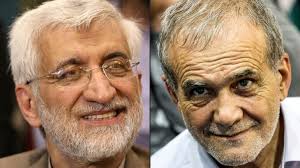TEHRAN: Iran will hold run-off presidential elections on July 5 to replace late hardline President Ebrahim Raisi, an official said on Saturday. The decision came after the initial vote saw the top candidates not securing an outright win. These elections will pit reformist candidate Masoud Pezeshkian against the hard-line former nuclear negotiator, Saeed Jalili.
Mohsen Eslami, the election spokesman, announced the result in a news conference carried by the Iranian state television. He said out of 24.5 million votes cast, Pezeshkian got 10.4 million while Jalili received 9.4 million. Parliament speaker Mohammad Bagher Qalibaf got 3.3 million. Shiite cleric Mostafa Pourmohammadi received over 2.06 lakh votes.
The Iranian law requires the winner to get more than 50 per cent of all votes cast. If not, the race’s top two candidates will advance to a runoff a week later. There has been only one run-off presidential poll in Iran’s history in 2005, when hard-liner Mahmoud Ahmadinejad bested former President Akbar Hashemi Rafsanjani.
Eslami acknowledged the country’s Guardian Council would need to offer formal approval, but the result did not draw any immediate challenge from contenders in the race.
As has been the case since the 1979 Islamic Revolution, women and those calling for a radical change have been barred from running, while the vote itself will have no oversight from internationally recognised monitors.
There had been calls for a boycott, including from imprisoned Nobel Peace Prize laureate Narges Mohammadi. Mir Hossein Mousavi, one of the leaders of the 2009 Green Movement protests who remained under a house arrest had also refused to vote with his wife, his daughter said.
There has also been criticism that Pezeshkian represents just another government-approved candidate. In a documentary on the reformist candidate aired by state TV, one woman said her generation was “moving towards the same level” of animosity with the government that Pezeshkian’s generation had in the 1979 revolution.
Raisi, 63, had died in the May 19 helicopter crash that also killed the country’s foreign minister. He was seen as a protégé of Iran’s supreme leader Ayatollah Ali Khamenei and a potential successor.
Still, many knew him for his involvement in the mass executions that Iran had conducted in 1988, and for his role in the bloody crackdowns on dissent that followed protests over the death of Mahsa Amini.


